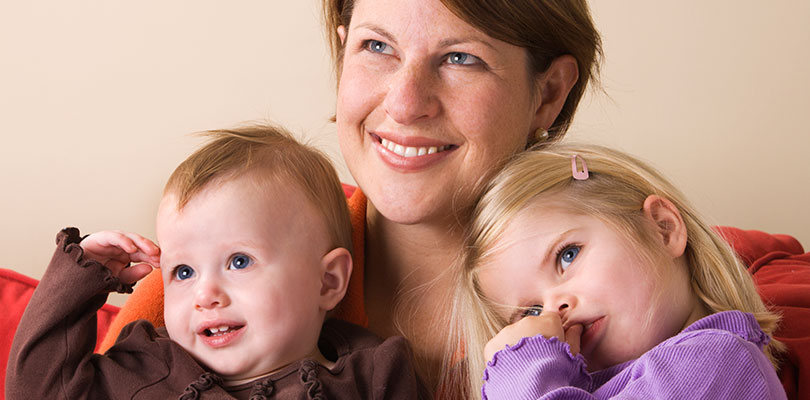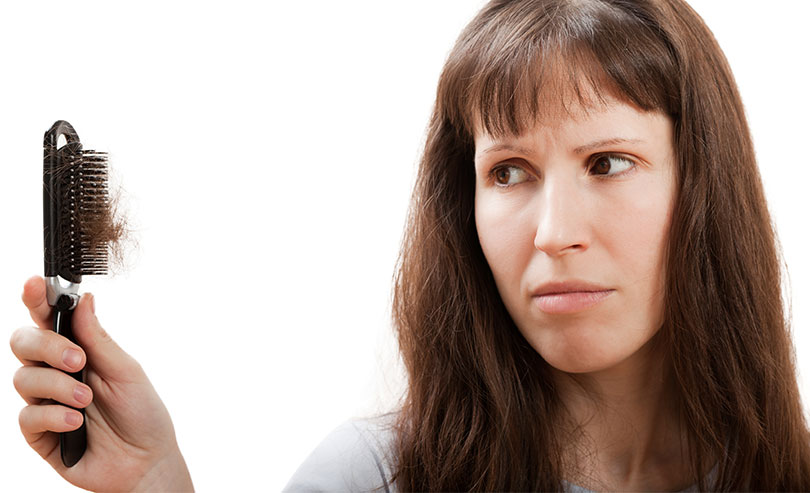Photo Credit: YinYang / iStockphoto.com
Tips to Manage Your Needs Along With Your Children's
If you had children in your late 20s you’ll be dealing with a teenager by the time you enter your early or mid-40s — precisely when perimenopause begins for many women. This sets the stage for a clash of hormones, and that can wreak havoc on a household for years.
As the average age of first-time mothers has risen over the years, so has the possibility of becoming a mother later in life. Many women can now pursue a career and devote their time and attention to motherhood, and that’s a big win.
Unfortunately, it can also make for a troubling and challenging spell when the constant demands of a baby or toddler coincide with the height of menopause symptoms.
Parenting through menopause is now a concern for a huge number of women, and there aren’t many manuals to lead you through the treacherous terrain.
Luckily, you are absolutely capable of battling fatigue, mood swings, hot flashes, night sweats, weight gain and cognitive trouble while raising a kid, although it might take some strategic thinking. Get in touch with the challenges that lie ahead, and take some tips to handle them more calmly and successfully.
The Challenges of Raising a Baby During Menopause
As more women are enjoying happy and healthy pregnancies well into their 40s, more mothers are facing the two-pronged challenge of menopause and infant care.
Perimenopause can start years before menopause officially arrives, and it can pack a punch: as your progesterone and estrogen levels spike and fall, your mood begins to suffer and you’ll find you’re very easily stressed and irritated. Raising an infant will challenge your tolerance and self-control in a few ways:
Sleep Deprivation
New mothers know all too well how much sleep suffers right off the bat, and while it’s not comfortable for anyone, that nighttime baby care can have severe ramifications when you’re approaching menopause.
It’s hard enough to get restorative sleep when you’re dealing with insomnia, night sweats, and other uncomfortable symptoms, so when a crying baby disrupts the little shut eye you do manage to get, you’ll be left exhausted and irritable, with less energy and confidence to cope with daily tasks.
Adrenal Fatigue
Your adrenal glands are important hormone factories, and they can begin to suffer when you transition into menopause. The strain gets worse when there’s an infant or toddler in the picture: irregular hours and near-constant physical and emotional work will trigger a stress response, which taxes your adrenal system even more.
If the cycle continues, you could wind up with what some doctors call adrenal fatigue, a condition that leaves you with muscle weakness, chronic fatigue and fuzzy thinking.
Depression
Menopausal women are at an increased risk of depression and anxiety, as are new mothers. Postpartum depression and depression associated with menopause may come from different situations, but they are both tied to hormone fluctuations and emotional issues.
It can be challenging to comb through all the facts on hormone therapy. Here are some of the pros and cons of HRT to help you on your way.
Naturally, dealing with two major body (and life) changes at the same can weigh heavily on your mind and mood, and spiral into depression more quickly than you might imagine.
It may seem impossible to find time for yourself when you have a baby or toddler to tend to, but in order to center your mind and satisfy your body’s needs, you must set aside some time to rest and relax. Call on a friend, family member, neighbor, or another sympathetic parent to cover for you while you take an hour to regroup. It can make a remarkable difference.
Learning to Connect With Your Adolescent Child
Many families find that puberty (and in turn, teenagehood) can disrupt the happy order of things, adding new challenges that test the resilience of a family. Throw in the ups and downs of menopause, and you’ve got a real recipe for turbulence. Luckily, there are a few approaches that can make things easier to handle around the house.
Focus on What You Have in Common
Both menopause and puberty can bring mood swings, depression, irritability, weight gain, breast tenderness, and above all, uncertainty. You and your adolescent or teen may be feeling a lot of the same things, although you may express yourselves quite differently.
Since hormonal changes have led you both into similar discomforts, you might also be positively affected by the same things. For instance, if you find that a peaceful, relaxing hour does you a world of good, the same could be true for your child.
Consider taking a yoga class together, or schedule in more communal quiet time (watching a movie is a good option) to connect when moods are lifted and things are going well — this can strengthen your bond immensely.
Pick Your Battles
A teenager’s volatility is only exceeded by their focus and energy. This adds up to stubborn emotional battles that can chip away at your patience and restraint. Yelling and fighting may not be completely avoidable, but there are ways to reduce the frequency of the attacks (and the emotional toll they take on you both.)
Instead of fueling the fire, try your very best to stay calm. Respond in a relaxed voice, and assure them you’re listening.
Stress that you have two different points of view, and there’s likely some way to meet in the middle. Remember that the more defensive (or offensive) you get, the more difficult it is to restore balance.
Talk Openly (and Often)
Communication is key in any relationship, but when volatile hormones are involved it’s even more important. Remind yourself and your kid that hormones are at the bottom of your clashes, and neither of you should feel guilty about that.
However, it’s worth taking some time to figure out your hormonal cycles or patterns, and respecting the “bad” times while taking advantage of the “good” times to connect. Also, be sure you both understand the basics of each phase: you probably remember some things about puberty, but a refresher could be useful, and your child should know a bit about menopause and how it affects you.
Improve Your Lifestyle, Improve Your Parenting
If mood swings and irritability are interfering with your parenting, take a step back and take a look at how you’re treating yourself. You may not be able to stop the surging hormones from sending your body and emotions into a tailspin, but you might be able to tame the effects.
Get Into a Healthy Routine
Taking better care of your body and mind can have immediate and long-lasting benefits for your mood. Regular exercise is probably the single most powerful weapon in the fight against irritability and anxiety, but a wholesome diet and frequent rests are also crucial for a more balanced demeanor.
Think Positively
Not only will positive thinking help you feel better (it can even reduce your level of pain and discomfort), it’s pretty contagious. When you counter a stubborn child with a gentle request, supportive words and encouraging suggestions, you’re much more likely to bring them back to a middle ground.
Take Time to Vent on Your Own
If you find yourself in a particularly stressful period, be sure you give yourself ample time away from the family (and any tense situation) to blow off steam and regroup. It’s not your fault for getting overwhelmed and frustrated, but how you choose to handle it is up to you.
Scream, run, dance, or meditate to leave your anger behind and get back to things with a fresh and balanced perspective.
It’s not always easy juggling your responsibilities, emotional dips, and your child’s needs and desires, but there’s always a way to get through the hard times. If you’re not making any headway despite your lifestyle changes and psychological efforts, it may be time to visit a counselor with your child to get a bit of outside help.
It can feel like you’re in this alone, but there are plenty of people who are trained, ready and willing to get your family life back on a happy and positive track.







